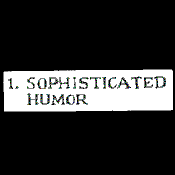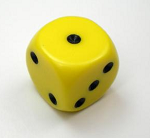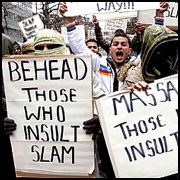|
Duke Hazzard, he gets into a lot of trouble.
|
|
|
|

|
| # ? May 20, 2024 10:10 |
|
Now, what you need to do after you've used a bunch of these is to introduce, say, Knight Treside. Players will try to figure out the joke to no avail. Then he sends you to meet his brother out in the boonies, Count Treside. (His first name is Frah, and he's plotting to kill the Knight)
|
|
|
|
Pollyanna posted:Duke Hazzard, he I really like the idea of an NPC who is always in mid jump whenever the party encounters them.
|
|
|
|
Sir Vile, a sniveling toady
|
|
|
|
Sir Veilance, an incorrigible peeping Tom.
|
|
|
|
Sir Cuss. Foul-mouthed ringleader of a troup that winters in the town. e: Sir Real, eldrich knight specializing in illusion. Sir Cut, local inventor. sleepy.eyes fucked around with this message at 14:53 on May 3, 2018 |
|
|
|
Don't forget the Non-Knight Tony Anflooid. Normally he's a pretty relaxed go-with-the-flow kind of guy, but he gets really stubborn under sudden stress.
|
|
|
|
|
Bad Munki posted:Don't forget the Non-Knight Tony Anflooid. Normally he's a pretty relaxed go-with-the-flow kind of guy, but he gets really stubborn under sudden stress. 
|
|
|
|
no one really rests easy when the Knight of the Long Knives is around
|
|
|
|
Bad Munki posted:Don't forget the Non-Knight Tony Anflooid. Normally he's a pretty relaxed go-with-the-flow kind of guy, but he gets really stubborn under sudden stress. Oh my god
|
|
|
|
Bad Munki posted:Don't forget the Non-Knight Tony Anflooid. Normally he's a pretty relaxed go-with-the-flow kind of guy, but he gets really stubborn under sudden stress. I'm pretty sure it'd be a crime to let this one go unused.
|
|
|
|
I kind of want to add a town to my map as a side quest playing on this, but the town is cursed by a witch who is obsessed with knights. Everyone else in the kingdom just kind of stays away from the town because they don't quite know what is happening there and have decided to leave it be.
|
|
|
|
Sir Anrap, sworn guardian of the Sallow Fane.
|
|
|
|
Have them arrive in town shortly after sunset and the first thing they see is a bunch of people tending to a knight on the ground. When they ask what happened, one of them points to the sky and replies "night fell." That should set the tone.
|
|
|
|
Sir Plus, a knight of cheap armour Hugh Midde, Knight in White Satin The stocks are known as the One Knight Stand
|
|
|
|
Bad Munki posted:Don't forget the Non-Knight Tony Anflooid. Normally he's a pretty relaxed go-with-the-flow kind of guy, but he gets really stubborn under sudden stress. Amazing.
|
|
|
|
Gnomish Knight Tro Glasierin and his Boomhammer are not to be hosed with.
|
|
|
|
Sir Reptitious - he's a sneaky bugger.
|
|
|
|
Visiting from Al-Qadim, the revolutionary, Sheikh Wevara.
|
|
|
|
Sir Vey, the cartographer.
|
|
|
|
Quick question, my players are creating my characters for a Curse of Strahd campaign, should I tell them beforehand that (mild spoiler I think) Barovia is in its own demiplane? Or should I let that be discovered naturally? Some of their questions that theyíve been asking me when coming up with backgrounds might be easier to answer if they knew that so Iím not sure if itís worth it to hide that nugget.
|
|
|
|
I'd tell them that the campaign is in its own secluded place/cut off from the rest of the world without explaining everything that means. Just so if they're writing a backstory where they're a member of an order of knights for example they'll know they're going to be cut off from that assistance.
|
|
|
|
Maybe encourage them to explore that fact in the fiction? They try and contact people from outside, leave the area, etc.
|
|
|
|
Tell the characters that there's something special about the scenario and to come to you with their character concept before they get too deep into it so that you can see if it clashes with the setting.
|
|
|
|
Yeah don't give away all the "Barovia is gonna gently caress you up" stuff, but do let them know that it's a basic gothic horror setting and if they are a weird race that doesn't exist in Barovia itself (i.e., if they're outsiders who wandered in through the mists) then they will be hardcore racisted (3.5e Barovia has an "outcast" stat even). If they are playing natives then fair play in my opinion is to tell the casters about spells that don't work (because they would never have learned them in the first place if they don't work) and possibly to let them know about how anything they summon from another plane is gonna be there permanently (you can avoid giving up "the secret" of the demiplane by phrasing it like "summons don't leave even if they are banished" or something - that way you don't spoil the possible "oh, oh no" moment of them summoning something big and mean.
|
|
|
|
Had an idea I wanted to run by people. I'm thinking about 5e D&D here but I think it can apply to any RPG with combat and hp systems. I was thinking of a separate system to narrate combat turns and hp losses, because hp is a decent system at abstracting one's ability to keep fighting but it doesn't play nice with narration that makes sense. Hp is a great system at showing how much you can keep fighting if your battle is two half-orcs going toe to toe with tree branches, but it stops making sense with more deadly weapons and spells. Like take a Douglas Fairbanks swashbuckling swordfight as an example. When we think of hp as just "how many times can somebody get stabbed before it becomes a life-threatening event," these two excellent fencers are doing dick-all to each other until one finally stabs the other for a zillion damage. That's dumb. A better conception of hp would show both fighters losing hp as a function of their declining stamina, losing their footing/positioning/momentum, having less range of motion as a pain response to more superficial wounds, etc. And that sounds great until you try to think of how to narrate that and you say your fighter lost a couple hp because they lost their footing, and then the fight ends the next turn and you're left wondering why that hp loss has remained after the fight's over. I can't help but think that if you reduce combat narration to once per every couple rounds or even once per fight and give a broader picture, you have a fight that seems more organic than "guys we have to stab Erasmus The Evil Wizard a hundred times" and hopefully save a lot of time that would have been spent on narrating every single round of combat. Now, I personally am not a big fan of traditional combat narration because I feel like as a player either the DM takes a little bit of my agency every time or I waste creative energy describing attacks that might not hit. As a DM I just don't like doing it but generally keep it up because it feel like a player want/expectation. So my feelings might be biased. But I wonder if anyone's tried this larger-scale, pared-down combat narration. Any ideas, anecdotes, suggestions, etc to share here? I'm gonna run it by a few communities to see what I can gather.
|
|
|
|
What you describe - HP as representative of stamina, luck, will to fight etc. - is actually a pretty common notion round these parts (and also part of at least D&D 3.5 and 4E basic HP rules), but you bring up a good point with why that HP loss remains after a fight. On the other hand, if HP were always straight physical damage and wounds, someone would bring up a good point by asking why wounds that brought you to within an inch of your life are suddenly completely okay again after a five minute sitdown.  I just tend to think of the aftereffects of combat as minor exhaustion, adrenaline wearing off, some superficial wounds that are easily patched etc and not think too much about it. If you want to ground it in the fiction more, it helps to have a system where you have a ressource you use to heal, like 4E's healing surges. You can only patch yourself up and take so much stress in a day before it really gets to you.
|
|
|
|
Ultimately HP doesnít make sense if you think of it as an actual thing. It ties into terms like getting hit and taking damage, itís determined by Constitution, but getting hit doesnít do anything until you die and increases rapidly as you level up. I think what youíre bumping up against is that DnD is not a narrative game at all, and you arenít actually supposed to describe attacks as anything flavourful. Iíve played in games where that was encouraged (13th age specifically, which is similar about that) and hp is just a mechanical thing because itís simple and doesnít lead to Death Spirals. My advice is donít bother and roll with whatís there, or try a different game without tactical combat, because the two donít mix.
|
|
|
|
Also about combat narration: I think a lot of players and DMs, particularly in D&D, see every action as defined by the rules as a single discrete observable action in the fiction of the game. If the fighter makes one basic attack, that means he swings his sword exactly once and either hits or misses. This makes a certain amount of sense, but can also lead to players wondering about the abstract nature of turn-based combat in general ("what, so everyone just waits for the fighter to finish his attack?"). I tend to think of a combat round and actions in combat as more of a summary of a few seconds' worth of events, where one attack may represent a bit of back-and-forth, with a focus on one particular combattant. In the mechanics the fighter makes one basic attack, in the narrative he briefly has the upper hand and does a few strikes, and the single roll is to see if the enemy's defense holds up over a few seconds. You probably see where I'm going: in a way I already do a "broader picture" narrative. I just apply it to the structure of rounds, turns and actions as it is. (Also I'm presenting a strongly idealized picture here. Usually the way our combats actually go is "I use Massive Strike, 24 vs. AC", "that's a solid hit", "cool, 16 damage.")
|
|
|
|
My Lovely Horse posted:Also about combat narration: I think a lot of players and DMs, particularly in D&D, see every action as defined by the rules as a single discrete observable action in the fiction of the game. If the fighter makes one basic attack, that means he swings his sword exactly once and either hits or misses. This makes a certain amount of sense, but can also lead to players wondering about the abstract nature of turn-based combat in general ("what, so everyone just waits for the fighter to finish his attack?"). This has always been the fluff and it's never made much sense to me, because you only get one decision a round, no matter how you fluff it.
|
|
|
|
It's the same kind of problem with AC. Even though it stands for "Armor Class" and you'd think that would make it your armor, it's also affected by your ability to dodge so it's more of a general "How hard is it to deal even 1 point of damage?" stat. If you're interested in creating a story with the combat instead of just playing a cold numbers game, it's up to the DM and players to try and figure out exactly what the narrative result of a miss is. It's one of the reasons I play GURPS mostly. Even the most basic cinematic rule set at least differentiates armor/cover and dodging ability, and depending on how rule-heavy you want to go you can have rules for just about anything you want. In some ways it makes crafting the narrative results easier, since you know if a blow was stopped by glancing off the armor or just plain missing, or if a hit only slightly pierced the layers and caused a minor wound.
|
|
|
|
|
Okay, assume that for every D&D question I have the preface of "I am aware other games exist and I am playing with what is available to me both in terms of game materials and (more importantly) player buy-in and am trying to make the most of it."
|
|
|
|
You might want to take a look at how Matthew Mercer handles combat in Critical Role. Here's a video with some combat; skip to 2:44:20 if the timestamp doesn't work. https://www.youtube.com/watch?v=_Ig_s9j4MuU&t=9801s He's obviously aided by really elaborate maps and good minis, but whenever he does a turn he narrates the results of the successful or failed roll to describe whether a failed hit just didn't penetrate or if it missed or if something put them off-balance and they fumbled the strike. If someone gets the final blow on a major target, he lets the player describe exactly how they want to make the kill within the realm of their character abilities. This video also shows how embarrassing it gets when you kill the main bad guy, only to nearly get two party members killed by an imp.
|
|
|
|
|
Nehru the Damaja posted:Had an idea I wanted to run by people. I'm thinking about 5e D&D here but I think it can apply to any RPG with combat and hp systems. HP can best be thought of as your "hero points" and demonstrates how much the narrative-spiders are willing to put up with your bullshit before you suffer a meaningful wound. Wizards have a harder time convincing the narrative-spiders because they are weak and frail and the story "wants" the nerd to get punked ASAP. I can't think of any system that combines narrative deadlines with the granularity of DnD that does not, simultaneously, have completely new problems as a result.
|
|
|
|
Nehru the Damaja posted:Okay, assume that for every D&D question I have the preface of "I am aware other games exist and I am playing with what is available to me both in terms of game materials and (more importantly) player buy-in and am trying to make the most of it." Thereís nothing you can do to fix combat narration not fitting because combat narration isnít part of D&D and never has. If you want to give it weight you have to overhaul not only the rules, but fundamental assumptions of how the game is designed, like the level of abstraction the game runs at. This isnít an unusual concept: itís the first thing other early rpgs like runequest and talislanta tried to change. We really canít help you.
|
|
|
|
Most games have a problem with combat narration, honestly. Game combat is usually poo poo at setting stakes. In an ideal world, a conflict begins with, "What is it you're trying to do?" and "Here's why you can't do that." In the case of combat, it's usually, "I'm trying to leave the castle" followed by, "and these guys aren't keen to let you leave." Where most games fail (for probably good reason, as I'll explore in a sec) is that they should then ask, "What are you willing to give up or sacrifice to achieve it?" If the answer is, "Nothing! I'm Gregor the Immortal and these foes are beneath me!" then, well, that isn't a conflict, it's a declarative statement. D&D usually answers this question with, "We'll wait and see", utilizing emergent finicky systems to figure out what, exactly, you have to give up to get past the guards; and usually that winds up being, "HP" or more abstractly, "time and resources." Most of what D&D takes from the characters can be measured in time and resources; HP is just a function of either items and/or abilities (resources) or resting (time). As far as epic stakes go, not exactly pulse quickening. I can imagine a system that asked those questions from the get go but it would be radically different from any system I've ever seen. I've seen systems that flirt with this idea (notably various incarnations of the EotE system or a few esoteric indies go still further) but these kinds of questions actually make for lovely gameplay. As it turns out, if you want to retain the sense of playing a game, "time and resources" is exactly what you want to tax - finicky, replaceable items so that you don't turn every conflict into a dramatic showdown. I suppose you could dispense with the idea of HP and damage entirely and just go with, "how many times, in a single adventuring block, can I conceivably by attacked with a weapon and not die?" Because that's all HP is attempting to answer. It hides that behind notions of different weapons having different levels of deadliness but that's what the core of it is, so anything you build is going to basically open up the entire game theory behind D&D from the neck down.
|
|
|
|
Let me introduce to you Powered by the Apocalypse games, friend. "What are you willing to give up or sacrifice to achieve this" is exactly what those games ask, and gameplay for them is loving awesome. In PbtA games, it's not just time and resources (though either is on the table), but sometimes it's more esoteric things like relationships or character concepts. So yeah, if you really want to leave the castle and those guys want to stop you, chances are good that you can make that happen. But it will certainly have consequences within the game's fiction, and you can almost guarantee that those will go beyond time and resources.
|
|
|
|
Ilor posted:Let me introduce to you Powered by the Apocalypse games, friend. "What are you willing to give up or sacrifice to achieve this" is exactly what those games ask, and gameplay for them is loving awesome. In PbtA games, it's not just time and resources (though either is on the table), but sometimes it's more esoteric things like relationships or character concepts. So yeah, if you really want to leave the castle and those guys want to stop you, chances are good that you can make that happen. But it will certainly have consequences within the game's fiction, and you can almost guarantee that those will go beyond time and resources. I have played several "World" games and while they are something anyone seriously interested in running games should study, conflicts sometimes explicitly just drain resources. For instance, HP still exists in DW and ammo, while smarter, is literally just a resource you can deplete. Still I regard to op, it's, better?
|
|
|
|
Mendrian posted:I have played several "World" games and while they are something anyone seriously interested in running games should study, conflicts sometimes explicitly just drain resources. For instance, HP still exists in DW and ammo, while smarter, is literally just a resource you can deplete. Conflicts in AW in particular are good for having broader consequences, even when the effect is largely mechanical rather than fictional. Being on the losing end of manipulation is a good example - by losing a stat highlight for a session, you lose out on experience, which means that you are in essence compromising your character's future. And if you cave to prevent that from happening, you're compromising your character's principles. Both of these are fantastic in play.
|
|
|
|

|
| # ? May 20, 2024 10:10 |
|
Rolemaster owns fyi and is still one of the best and cleanest combat/skills engines ever made.
|
|
|












































